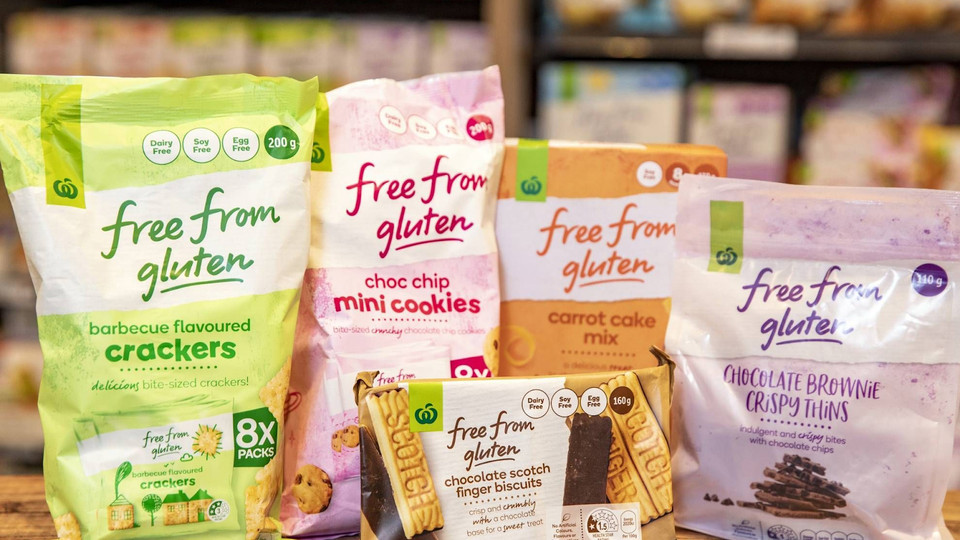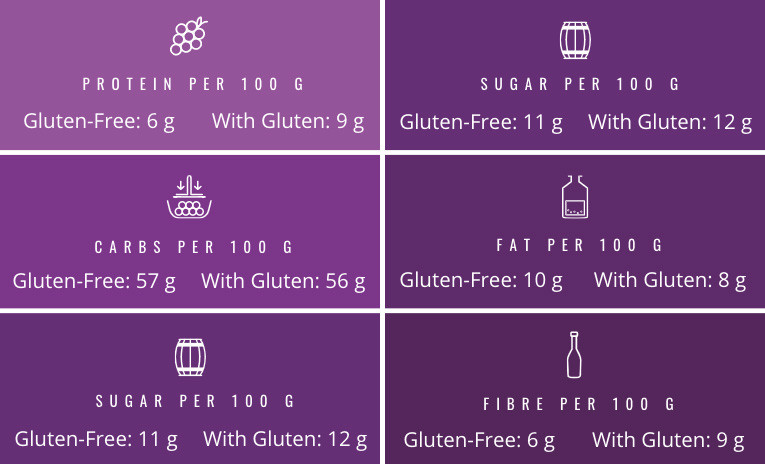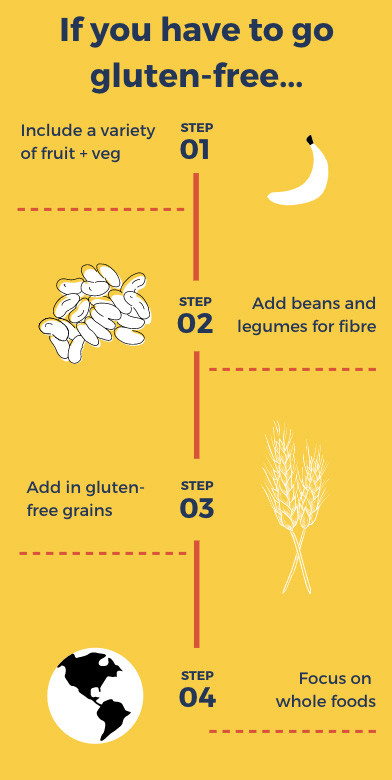
Let’s dive into the truth about a gluten-free diet…
What exactly is gluten?
Gluten is a term used for a family of proteins called prolamins, found in many grains such as wheat, barley and rye. People with celiac disease, an inherited autoimmune condition, are recommended to follow a gluten-free diet. For these people, consuming gluten in their diet can cause damage to their small intestines, causing them to have difficulty absorbing nutrients. However, celiac disease only affects around 1% of the population…and yet the number of people following a gluten-free diet has significantly increased in recent years.
The rapid rise in popularity of a gluten-free diet has been driven by consumer marketing, with firms promoting the apparent health benefits and weight loss potential that a diet without gluten can achieve, as well as fear-mongering around the supposed negative impacts of gluten on our health.
What does a gluten-free diet involve?
The gluten-free diet requires the elimination of wheat, barley and regular oats from your diet (some specific gluten-free oats are permitted), and being excessively cautious to avoid gluten contamination in all foods. Obvious ‘no’ foods include pizza, pasta, regular bread and cereal, but gluten can also often be found in soy sauce, canned goods and packaged sauces or marinades.
So it’s a serious commitment to actively avoid gluten
But is it worth it?
- May assist with IBS symptoms in some people
- Important for those with celiac diseas to manage the condition by going GF
- May reduce inflammation in women with endometriosis
- Missing important nutrients like fibre, B vitamins
- Consuming excess additives and nasties in gluten-free products
- Social isolation or anxiety/stress
- More expensive
Sure, the gluten-free diet offers benefits for some of us – particularly those suffering from specific health conditions. Let’s dive into the positives…
1. It may improve IBS symptoms
Gluten has been shown to worsen gastrointestinal and non-gastrointestinal symptoms in people who suffer from Irritable Bowel Syndrome (IBS). It can contribute to:
- Pain
- Bloating
- Digestive issues, and
- Tiredness, even within just one week of including it in your diet.
If you suffer from IBS, absolutely avoiding gluten and adopting a gluten-free diet may help manage or prevent these symptoms.
2. To state the obvious, it’s a great option for those with celiac disease
The reason the gluten-free diet even came to fruition was as a means of controlling celiac disease, and preventing damage to the small intestine, and other negative symptoms of this condition. If you struggle with celiac disease, adopting the gluten-free diet has been shown to prevent further damage to your stomach, so your body can continue to absorb nutrients and minerals from your food.
3. It may help women with endometriosis
A gluten-free diet may assist in improving symptoms of endometriosis, a disorder occurring in women where the tissue that normally lies inside your uterus grows outside the uterus too, often causing significant pain. Some research has shown a gluten-free diet can have some impact in reducing the inflammation associated with endometriosis, potentially reducing the severity of some of the symptoms at the same time.
- Painful periods
- Pain during or around ovulation
- Pain during or after intercourse
- Heavy or irregular bleeding
- Pain with bowel movements
- Pelvic area, lower back, or leg pain
- Nausea
- Fatigue
What they don’t tell you…
So while we’ve seen that a gluten-free diet can be useful for some very specific health conditions, does this mean it’s a healthier diet for everyone to follow – even those who can tolerate gluten?
If you’re interested in adopting a gluten-free diet for its perceived health benefits and its association in marketing and the media with weight loss, you might want to read this first…
1. Poorer nutritional quality
Despite the fact that we’re constantly hearing how a gluten-free diet is a healthier alternative to a normal western diet, research has actually found avoiding gluten often has a negative impact on the nutritional quality of your diet.
An Australian study conducted in 2015, ‘Gluten-free food database: the nutritional quality and cost of packaged gluten-free foods,’ found the nutritional benefits of a gluten-free diet were non-existent, in fact it had poorer nutritional value than a gluten-containing diet.

Unlike gluten-containing foods, gluten-free alternatives are normally not enriched with nutrients, and so may be deficient in important nutrients such as fibre, iron, and B vitamins including folate, niacin, riboflavin and thiamine.
They’ve also been found to contain higher amounts of salt, trans fats and saturated fats than their gluten-containing counterparts. Gluten-free foods also have a consistently lower protein content than their gluten-containing alternatives. Many gluten-free options have added flavouring, sugar, salt etc to enhance the flavour or texture that suffers as a result of removing gluten from the food.
So evidently, the gluten-free diet is not a healthier, more nutritious alternative to a regular gluten-containing way of eating. In fact, it puts you at risk of missing out on important nutrients, and gluten-free alternatives often pack in plenty of hidden nasties to compensate for the loss of flavour and texture that gluten offers.
2. $$$ cost
Research found that gluten-free foods are far more expensive than their gluten-containing alternatives.
In fact, gluten-free products were 242% more expensive than regular food products, on average.
The previous 2015 Australian study discovered that gluten-free cereals were 205% more expensive, and gluten-free bread and bakery products were 267% more expensive.
Considering these products are no healthier or more nutritious than gluten-containing counterparts, this is a hefty price tag, which marketing companies have very effectively positioned to seem highly appealing.
3. Going gluten-free comes with a social and mental cost
Sticking to a strict gluten-free diet requires serious commitment, planning and effort. It can be quite restrictive to eliminate all gluten-containing foods from your diet, and the stress involved in maintaining this way of eating, and strictly adhering to the limitations it brings, can have a negative impact on your emotional and psychological wellbeing.
Avoiding gluten purely with the intention of improving your health can encourage an obsessive or disordered relationship with food. In particular, failing to strictly adhere to rigid food “rules” can also cause negative emotions and encourage self punishment.
In our society, food is such a communal, emotional experience, and adding any form of restriction or deprivation around this can lead to social isolation, anxiety, and other negative psychological impacts.
So what’s the bottom line?

- Include sources of fibre, such as a variety of fruits and vegetables, beans and legumes.
- Incorporate gluten-free sources of grains, such as buckwheat, quinoa and millet. These are rich in B vitamins and fibre, and can help fill nutritional voids present in many people’s gluten-free diets.
- Focus on eating whole foods over packaged gluten-free products, first and foremost. You can be sure these won’t have added nasties and artificial ingredients – they taste phenomenal without any of that!
So for those who were convinced gluten-free was the healthy option…
Aim to incorporate sources of wholegrains into your diet daily – things like rye, oats, brown rice, spelt – these are packed with fibre and B vitamins, and support gut health, immunity and energy levels.
Don’t let anyone tell you gluten-free is the way to go for another moment! It’s perfectly healthy to include in your diet as part of a balanced lifestyle.



